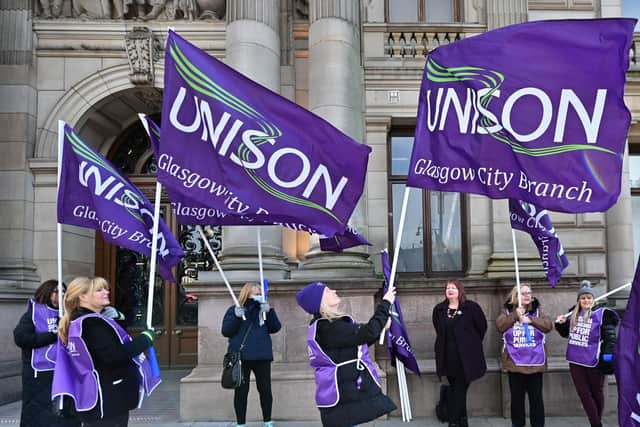Trade unions need to think hard about impact of industrial action – but governments need to do more – Sandy Begbie
This phrase refers to decreased macroeconomic volatility across western democracies between the 1980s and the mid-2000s. Professor Roy highlighted those years of relative economic calm as all but a distant memory, replaced by unprecedented prolonged economic upheaval beginning with the financial crash of 2008 and culminating in the global pandemic which continues to transcend our outlook.
Indeed, recovery remains very fragile with this week’s published ONS figures indicated the UK’s economy is shrinking and we may be heading towards a recession. .
Advertisement
Hide AdAdvertisement
Hide AdThe situation could not be starker. The UK inflation rate is at its highest level in a generation, interest rates are rising, investment remains below pre-pandemic levels, uncertainty following Brexit remains a drag, the property market is showing signs of strain, levels of unsecured borrowing are at record levels and unemployment is forecast to rise.


Given this challenging context, it isn’t surprising we are also facing one of the most volatile employee relation environments in almost 40 years. However, the wider implication of industrial action needs to be considered carefully.
There is a real risk that prolonged industrial action will negatively impact businesses across all sectors, especially retail, tourism, leisure and hospitality. Many of these , the lifeblood of our economy, are just beginning to emerge from the destabilising impact of the pandemic and further disruption will undoubtedly take a toll.
While there is no doubting the cost-of-living crisis the country is facing, it is imperative governments, trade unions and the private sector tackle this situation collaboratively.
If we don't, businesses will be pushed to breaking point and individuals will be further adversely impacted. Action in one sector is not contained, our economy is inter-connected and settlements that don’t take in to account the wider economy will be a pyrrhic victory if what we remember in decades to come is the damage done to a fragile recovery in the longer-term.


Trade Unions’ demands for inflation level pay increases are to be expected and understandable. Those front-line and emergency workers who helped support and protect us over the last two and a half years are deserving of more pay.
However, public services are paid for through taxes and borrowing. The UK has one of the highest levels of taxation in the western world. In Scotland it is even higher, and a level of borrowing that is unsustainable over the long term.
There must be focus on reducing the tax burden on businesses and individuals if we want to encourage investment and protect jobs.So why are financial services so interested in the negotiations? As businesses stop trading and unemployment rises, our banks will be front and centre of helping people. While the banks are well placed and willing to do that, as a sector, we believe all parties need to come together to find an agreed way forward, one that doesn’t result in wider collateral damage.
Advertisement
Hide AdAdvertisement
Hide AdWe have four key asks of government and trade unions:1. Trade unions to carefully reflect on the wider economic damage industrial action may have.2. The Scottish and UK governments to engage in meaningful dialogue with unions to avoid strike action and agree on sensible pay increases the public purse can afford.3. For all governments, across the four nations, to explore ways of reducing the tax burden which will result in higher tax receipts and stimulate investment.4. For governments to engage with the private sector to deliver improvement in productivity, leading to business investment, growth and employment.
The financial services industry recognises it has a key role to play in supporting the above and we will not shirk our responsibilities. We need to now come together and face reality. It is a reality that if we don’t collaborate effectively, the economic shock will be far greater and longer than anticipated.
We must accelerate these efforts as a matter of priority to get our economy on a firmer footing.
Sandy Begbie CBE, chief executive, Scottish Financial Enterprise
Comments
Want to join the conversation? Please or to comment on this article.